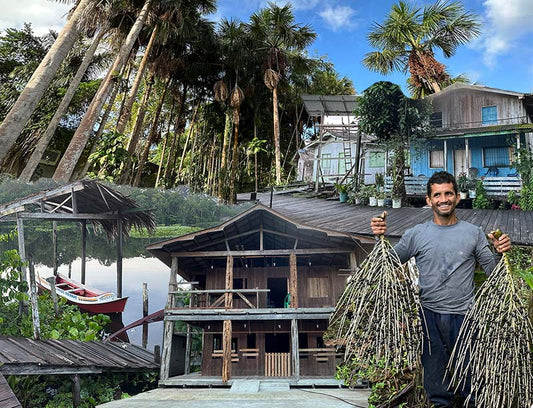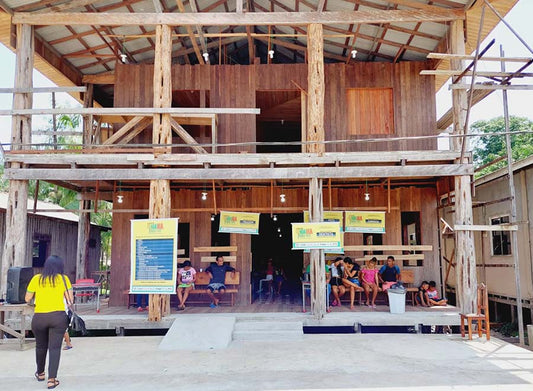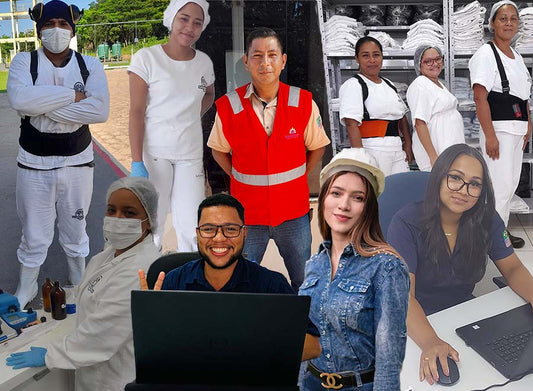At SAMBAZON, we do our best to reduce waste by following good inventory management practices. Not only is it good for business, it’s the right thing to do for our planet. We consider each piece of the business in the aim of creating a more circular economy when it comes to our waste, packaging and plastic use. The eventual goal is to have packaging that is kept in circulation so that it never becomes waste or pollution.
We aim to ensure that our product gets to our customers safely so they can enjoy the Delicious Powers of Açaí while knowing that SAMBAZON is doing all that it can to take care of the planet. In this blog, we’ll outline different efforts that we’ve made over the past year that help improve our overall performance when it comes to our waste.
Turning Leftover Seeds into Energy!
One way that we take care of the waste that our food processing creates is by donating our seeds. Did you know that 90-95% of Açaí berries are made up of the seed? 100% of our seeds that would have been wasted are donated to be turned into energy.
Our landfill diversion rate is over 99% This means we send almost all of our waste to be turned into energy, be reused, or be recycled! Seeds make up 97.48% of our waste, and the other 2.52% is majority reused (34%), composted (10%), or recycled (15%). Only 29% of that other waste is sent to a landfill, which is a number we intend to reduce.
Choosing our Partners Wisely
We partner with Denali Corp, an environmental services company, to divert our food waste from the landfill. They are one of the largest organics recycling providers in the United States, providing services to collect and recycle a variety of organic materials into a diverse mix of industrial & commercial products. They help collect and divert over 6,000,000 tons of material a year that would otherwise go to landfill. That material is used to create biofuel, clean water, animal feed, soil for compost and organic fertilizer.
Products that are damaged, have expired, or don’t meet food quality specifications are reused, recycled, or refined to make byproducts. Denali not only processes and recycles the product itself, but also facilitates the sorting, consolidation, and recycling of the packaging it comes in. Our metal drums are reused by Denali Corp in the transportation of cooking oil from restaurants. They then turn the cooking oil into biofuel.
We’re proud to partner with a company that aims to replenish the earth by re-purposing waste.
Improving our Packaging
When we choose our packaging, we take into consideration contributors such as food safety, food waste, shipping weight, energy usage, waste reduction and production efficiency. Like many companies around the world, at SAMBAZON, we realize we can continue reducing our contribution to plastic pollution. That’s why we have dedicated a team and invested resources to test new, compostable materials and technologies.
We’ve also been spearheading change within our industry: in 2018, we joined the One Step Closer (OSC) Packaging Collaborative with the goal to remove petroleum-based plastics from landfills, oceans, and our planet.
One of the Packaging Collaborative’s key initiatives is to help brands transition into compostable Flexible Films. Through this collaborative network, we are pioneering, testing, and trialing viable plant-based alternatives for the hard-to-replace frozen flexible films. This is a complex problem that, once we solve, will enable us to eliminate most plastic from our frozen items.
A New Packaging Innovation: Smoothie Cubes
Our latest and greatest product innovation, Açaí Smoothie Cubes, is not only a great option for enjoying Açaí on-the-go, it’s also innovative in its packaging. With this new product, we were looking for ways to reduce excess packaging, specifically plastic. By removing the need for inner liners for this product, we were able to not only offer an easy-to-use Açaí option but also provide a more sustainable packaging alternative.
By removing the inner film and using a paper outer liner on the bag, there is a 43% reduction per ounce of product compared to similar products. It's been exciting to see the response to our Açaí Smoothie Cubes and we’re excited to continue innovating as we develop new products with delicious taste, functionality, and packaging!
Our International Environmental Impact
This past year we’re specifically excited about bringing our plant-fiber Ready to Eat Bowls to the global market. SAMBAZON can be found in over 50 countries! In our international markets, 78% of the products are in the plant-based category, and a lot of that is thanks to the 100% plant-fiber based bowl. There has been great excitement around our Ready to Eat Bowls from an environmental standpoint, and we’re excited to keep spreading the Delicious Powers of Açaí globally.
Updates to the Brazil Recycling Program
Another way we are reducing the impact of our packaging for products sold in Brazil is through the eureciclo certification program. Eureciclo ensures that the same quantity of post-consumer packaging that we put into market is recycled. This program uses tracking technologies and external auditing to ensure the correct destination of packaging for recycling. For SAMBAZON in 2022, this amounted to 18.76 metric tons of packaging recycled. Money generated from this program also goes to funding recycling sorting centers thus helping to expand the recycling chain in Brazil.
We take all waste into account at SAMBAZON, at our factories in Brazil, our team makes sure that any unusable products have the various parts properly recycled. This means any packaged goods are emptied and sorted- recycle the packaging, and composting any food waste. Just like you may be doing at home!
The Future of our Packaging
Our team is actively monitoring new packaging regulations – specifically in California. These regulations impact our decisions, but they also inspire us to constantly improve to stay ahead of those standards. While the global infrastructure gap in packaging is an ever-present challenge, we are lucky to have innovative minds pushing our company forward in the pursuit of reducing our waste and packaging impact.







Comments
(0 Comments)Please note, comments need to be approved before they are published.